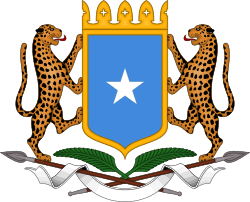Elections in Somalia
Popular elections are to be held in Somalia in 2020 for the first time since 1969.[1] UNSOM has been mandated to support the preparation for the elections. [2]
 |
|---|
| This article is part of a series on the politics and government of Somalia |
|
|
|
Constitution |
|
|
|
|
Judiciary |
|
|
|
|
|
International Partners
In December 2019 the International Partners released a joint press statement urging that the future election model of Somalia should:[3]
- Respect the Constitution;
- Ensure that the federal elections are held on time in late 2020/early 2021, without extension of the terms of the Executive or Parliament;
- Ensure fair representation of all Somali communities;
- Afford the Somali people the opportunity to directly elect their representatives through “one person, one vote”;
- Include a role for political parties in the elections;
- Guarantee a minimum of 30 per cent representation for women in the Federal Parliament;
- Enable the broadest possible participation including of internally displaced persons;
- Enjoy wide support among all Somali stakeholders;
- Be capable of being implemented effectively and securely and of attracting sufficient funding through application of these principles;
- Result in peaceful election of leaders who have broad legitimacy, and
- Respect the mandate of the National Independent Electoral Commission.
International Partners include: African Union Mission in Somalia (AMISOM), Canada, Denmark, Ethiopia, European Union, Finland, France, Germany, Intergovernmental Authority on Development (IGAD), Italy, Kenya, Norway, Sweden, Switzerland, United Kingdom, United Nations and United States.
Overview
During the civilian administration that existed prior to the seizure of power by the Supreme Revolutionary Council (SRC) in 1969, there were a number of local political parties. Most notable of these early institutions was the Somali Youth League, the nation's first political organization. Upon assuming office, the Siad Barre-led SRC outlawed all extant political parties and advocated a form of scientific socialism inspired by Maoist China and the Soviet Union. Following the outbreak of the civil war in 1991 that saw the ouster of the Barre regime, many of the few remaining political parties gave way to autonomous or semi-autonomous regional states in the northern part of the country, or fragmented into feuding militia groups in the south. After several unsuccessful national reconciliation efforts, a Transitional Federal Government (TFG) was formed in 2004 with a mandate leading toward the establishment of a new constitution and a transition to a representative government.[4]
Post-transition
In June 2011, the mandates of President Sharif Sheikh Ahmed, the Parliament Speaker Sharif Adan Sharif Hassan and Deputies were extended until August 2012, after which point new elections were to be organized.[5]
As part of the official "Roadmap for the End of Transition",[6] Somali government officials met in the northeastern town of Garowe in February 2012 to discuss post-transition arrangements. After extensive deliberations attended by regional actors and international observers, the conference ended in a signed agreement between President Sharif Sheikh Ahmed, Prime Minister Abdiweli Mohamed Ali, Speaker of Parliament Sharif Adan Sharif Hassan, Puntland President Abdirahman Mohamed Farole, Galmudug President Mohamed Ahmed Alim and Ahlu Sunnah Waljama'a representative Khalif Abdulkadir Noor stipulating that:
- a) a new 225 member bicameral parliament would be formed, consisting of an upper house seating 54 Senators as well as a lower house;
- b) 30% of the National Constituent Assembly (NCA) is earmarked for women;
- c) the President is to be appointed via a constitutional election; and
- d) the Prime Minister is selected by the President and he/she then names his/her Cabinet.[7][8]
The 2016/2017 election was an improvement on previous elections where many votes were bought, but it was still by indirect suffrage. The last one-person-one-vote election in Somalia was in 1969 and the resulting government did not last the year. Under Halima Ismail Ibrahim and the National Independent Electoral Commission another one person one vote election will take place at a cost of $53 million in 2020/2021.[9]
See also
- Electoral calendar
- Electoral system
References
- "Ex-Somalia President sets eye on the presidency seat on 2020". Goobjoog News. 24 January 2019.
- "ELECTORAL SUPPORT". UNSOM. 12 April 2016.
- "INTERNATIONAL PARTNERS JOINT PRESS STATEMENT ON ELECTIONS IN SOMALIA". UNSOM. 19 December 2019.
- "Somalia". World Factbook. Central Intelligence Agency. 14 May 2009. Retrieved 31 May 2009.
- Somalia: PM Mohamed Abdullahi Farmajo resigns
- Ahmed, Muddassar (8 August 2012). "Somalia rising after two decades of civil war and unrest". Al Arabiya. Archived from the original on 9 August 2012. Retrieved 9 August 2012.
- Somalia: Garowe conference comes to a close Archived 12 June 2012 at the Wayback Machine
- Second Garowe Conference Concludes Archived 27 December 2014 at the Wayback Machine
- "2020 is "a pivotal year" for Somalia – Poll agency". HalQaran.com. 22 November 2019. Retrieved 19 March 2020.